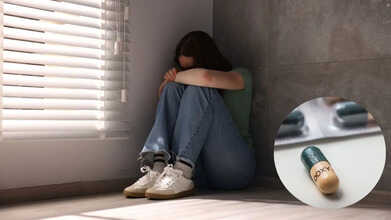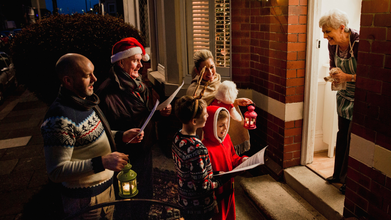- Health Conditions A-Z
- Health & Wellness
- Nutrition
- Fitness
- Health News
- Ayurveda
- Videos
- Medicine A-Z
- Parenting
Why Do You Sleep More In Winters? It Has Everything To Do With Your Hormones

Sleep In Winters ( Credit: Canva)
There is a scientific reason behind why humans tend to sleep more during winters and it is related to your hormones. Many people notice they feel more fatigued in winter, even though their overall sleep needs remain consistent throughout the year.
Sleep needs for most adults range from seven to nine hours per night, regardless of the season. However, it is common to feel like you’re sleeping more in winter due to the earlier onset of darkness during standard time.
Seasonal Sleep Changes
Recent studies indicate that humans, like some animals, experience subtle seasonal variations in sleep. Research conducted in Berlin found participants slept about an hour longer in winter than in summer, with 30 additional minutes of rapid eye movement (REM) sleep during the colder months. To note, REM sleep is crucial for memory, mood regulation, and immune function.
How Light Affects Sleep
Our sleep-wake cycle or the circadian rhythm is closely tied to sunlight. Bright light signals the body to stay awake, while darkness prompts melatonin production, a hormone that helps regulate sleep. During winter, shorter days and longer nights lead to earlier melatonin release, which may make you feel sleepier earlier in the evening. The same goes for the morning, late sunrise makes you sleep more.
However, social habits, like late-night outings during summer, can disrupt this rhythm. As per a clinical psychologist specializing in sleep, the body may struggle to adjust to sleeping earlier during winter nights, leading to delayed sleep onset or increased sleepiness.
Environmental Changes
The challenge to stay awake for longer hours extends beyond the biological changes that your body goes through. Winter season is the holiday season with celebrations such as Thanksgiving, Christmas and New Year's. Holiday stress, indulgent eating, alcohol consumption, and skipping workouts can also affect sleep. These behaviours, combined with seasonal affective disorder (SAD), may further increase the desire for sleep.Adapting To Winter Sleep Patterns
While humans do not hibernate, minor adjustments can help manage winter sleepiness. Experts recommend:- Morning Light Exposure: Natural sunlight or light therapy using a light box can regulate your circadian rhythm and alleviate symptoms of SAD.
- Consistent Sleep Schedule: Maintaining regular sleep and wake times helps stabilize your internal clock.
- Creating a Sleep-Friendly Environment: A dark, quiet, and cool bedroom promotes restful sleep.
Additionally, workplaces and schools could consider later start times during winter to align with natural light patterns, enhancing alertness and productivity.
When Should You See A Doctor?
If seasonal sleep changes lead to depression or difficulty functioning, consult a healthcare professional. According to health experts, seeking support for seasonal depression is important for maintaining overall health and well-being.
While winter's shorter days can make you feel sleepier, understanding the role of light and adjusting your habits can help you navigate the season effectively. Embrace these changes, but don’t hesitate to seek help if you find yourself struggling with sleep or mood disruptions.
Doxycycline: Common Acne Treatment Linked To A Notable Drop In Schizophrenia Risk

Credits: Canva
An antibiotic routinely used for acne has been linked to a lower likelihood of developing schizophrenia. A new investigation from the University of Edinburgh found that adolescents receiving mental health care who were given doxycycline had a reduced chance of being diagnosed with schizophrenia as adults, compared with those who were prescribed other antibiotics.
Although these early findings cannot confirm that doxycycline prevents schizophrenia, the researchers suggest that its influence on immune activity, inflammation, and programmed cell death may help protect the brain from changes associated with the disorder. “Because this research relies on observational records, it cannot prove that doxycycline directly lowers the risk of schizophrenia, so more studies are needed,” the authors explain.
“Even so, the results raise the possibility that doxycycline could play a role in lowering schizophrenia risk among young psychiatric patients and open new avenues for prevention-focused mental health research.”
What Is Schizophrenia?
Schizophrenia is a severe psychiatric disorder that affects about 23 million people worldwide, with most cases identified during late adolescence or early adulthood. The illness can appear suddenly and may bring on psychosis. Typical symptoms include ongoing delusions, hallucinations, disorganized thoughts, restlessness, or withdrawal from others. According to the World Health Organization (WHO), more than two out of three people experiencing psychosis lack access to specialized mental health services.
What Is Doxycycline?
Doxycycline is a broad-acting antibiotic commonly given to teenagers for acne. Some recent research suggests it may also offer certain protective effects for the brain, as it is able to cross the blood-brain barrier. In 2024, Science Alert reported on a Danish study showing that this brain-penetrating antibiotic was associated with a lower likelihood of schizophrenia patients later receiving disability benefits, hinting at how the illness might affect their daily functioning.
To explore this further, child and adolescent psychiatrist Ian Kelleher from the University of Edinburgh led a large international team in reviewing data from more than 56,000 people born in Finland between 1987 and 1997. All had used mental health services in their youth and had been prescribed antibiotics during that time.
The analysis showed that those given doxycycline had a 30 to 35 percent lower chance of developing schizophrenia over the following decade, compared with individuals who had taken other antibiotics. The risk dropped from 2.1 percent in the non-doxycycline group to 1.4 percent in those who used doxycycline.
Doxycycline Linked To A Drop in Schizophrenia Risk
The research team found that taking doxycycline was linked to a 30 to 35 percent reduction in schizophrenia diagnoses over ten years. One theory is that doxycycline may clear an infectious agent that contributes to schizophrenia. Another possibility is that it directly affects inflammation and nerve pathways inside the brain.
Other antibiotics offer hints as well. A 2019 study using stem cells from people with schizophrenia and healthy volunteers showed that minocycline can reduce excessive loss of synapses, a process thought to play a part in schizophrenia. Since both minocycline and doxycycline belong to the tetracycline family, they may share similar properties. Using Finland’s health records, Kelleher’s team noted that nearly half of all psychotic disorders in the population occurred in individuals who had visited adolescent psychiatric services.
The researchers believe this stage of life may offer a valuable period for early intervention, where medications like doxycycline might help reduce the chance of the illness progressing. “Nearly half of the people who develop schizophrenia had earlier contact with child and adolescent mental health services for other issues,” Kelleher says.
“At the moment, we do not have any proven ways to lower the risk of schizophrenia in these young people, which makes these findings encouraging.”
Does Doxycycline Have Side Effects?
Doxycycline is available in two forms, doxycycline monohydrate and doxycycline hyclate, though both tend to cause similar reactions. This list does not include every possible side effect, so consult your medical provider if you are unsure about anything you notice while taking the medication.
Mild doxycycline side effects include:
- Nausea or vomiting
- Diarrhea
- Sensitivity to sunlight
- Sore throat or difficulty swallowing
- Vaginal yeast infection
- Itchy skin and rash (urticaria)
Rare but serious doxycycline side effects include:
- Ulcers in the esophagus
- Severe skin reactions
- Liver problems
- Tooth discoloration in children
- Clostridioides difficile (C. diff) diarrhea
- Intracranial hypertension (increased pressure around the brain)
- Low blood cell counts
Always speak with your healthcare professional before starting or stopping any medication.
Doctor In Matthew Perry Overdose Case Sentenced: What Is Ketamine And How Can An Overdose Affect The Body

California-based Dr. Salvador Plasencia, who supplied 20 vials of ketamine to Matthew Perry, the Friends (1994–2004) star, has been sentenced to 30 months in prison. Perry, 54, was discovered dead in his luxurious Los Angeles home on October 28, 2023. The actor had a history of depression and substance use but was reportedly on the path to recovery. His final on-screen appearance was playing himself in the 2021 feature-length special, *Friends: The Reunion*.
Perry accidentally drowned due to the acute effects of a ketamine overdose. Five individuals faced charges in the case, all of whom eventually pleaded guilty. Dr. Plasencia is the first person to be sentenced in connection with Perry’s death. In addition to his 30-month prison term, he was ordered to pay a fine of $5,600. But what exactly is ketamine, and how can an overdose affect the body?
Doctor Who Supplied Matthew Perry Ketamine Pleads Guilty
Perry was found dead in his hot tub on October 28, 2023, at age 54. The LA County Medical Examiner determined that his death resulted from the “acute effects of ketamine,” with contributing factors including drowning and coronary artery disease. In July 2025, Dr. Plasencia pleaded guilty to felony charges for distributing ketamine to four individuals. He also confirmed that Perry had received multiple doses of the drug prior to his death. Perry’s death in Los Angeles, California, was officially attributed to the “acute effects of ketamine,” which caused him to lose consciousness and drown in his hot tub. He had struggled with substance abuse for years and had been receiving ketamine treatment for anxiety and depression at an accredited clinic, according to the BBC.
What Is Ketamine?
Ketamine is a medication used by doctors as an anesthetic to induce temporary loss of consciousness. Under the Controlled Substances Act, it is classified as a Schedule III non-narcotic substance. The FDA has approved ketamine for use only as a general anesthetic. However, in some cases, doctors prescribe it “off-label” for conditions such as depression. “Off-label” refers to using a drug for a condition that the FDA has not specifically approved.
How Does Ketamine Overdose Harm Your Body?
Certain medical conditions can make ketamine overdose riskier. People with heart disease or high blood pressure may experience increased intracranial pressure, raising the chance of stroke. Blood flow to the heart can be reduced. As a relaxant, excessive ketamine can interfere with breathing, causing it to become shallow. High doses can also be toxic to the liver and urinary bladder. Unregulated or repeated use may lead to dependence and increase the risk of developing schizophrenia.
Side Effects Of Ketamine
At prescribed doses, common side effects of ketamine, according to Medical News Today, include:
- Drowsiness
- Double vision
- Confusion
- Nausea
- Vomiting
- Dizziness
- A general feeling of unease
Ketamine can also cause a wide range of other symptoms affecting different parts of the body, though these are less frequent.
Ketamine As A Drug Of Abuse
Ketamine can produce sensations of detachment from the environment, pain relief, and hallucinations, which has led to its misuse. Recreational users often describe feelings of being separated from their body or a floating sensation. Some report near-total sensory detachment, which they compare to a near-death experience.
The drug is particularly popular among teens and young adults in club settings. Many users prefer ketamine trips to PCP or LSD because the hallucinations are shorter—lasting 30 minutes to an hour—rather than several hours.
Always consult a healthcare professional before starting, stopping, or changing any medication.
The Time Of Christmas Carol Is Here; The Best Part? Singing Is Good For Your Health, Say Studies

Credits: iStock
As December rolls in, familiar melodies float through malls, train stations and sometimes right outside your front door. Carol groups wrapped in tinsel bring a warm sense of nostalgia. Their voices rise in unison, cheerful and bright, filling cold evenings with a comfort that feels almost instinctive. What most people do not realize is that this seasonal tradition may be giving the singers themselves a genuine health lift.
Researchers have been exploring this for years, and their findings suggest that singing is far more than a joyful holiday hobby. It strengthens social bonds, supports emotional wellbeing and even offers physical benefits that reach deep into the brain and lungs.
Why Singing Feels So Good
Alex Street, a researcher at the Cambridge Institute for Music Therapy Research, describes singing as a cognitive, physical, emotional and social act, as reported by BBC. When people sing, especially in groups, the brain lights up in ways few other activities can replicate. Regions responsible for language, movement and emotion get activated at the same time. The steady breathing that singing requires also prompts the release of endorphins, which brings on feelings of pleasure and reduces pain.
Psychologists have long noted how even strangers can develop a sense of togetherness after singing side by side for just an hour. This may explain why community choirs often feel like extended families.
A Simple Workout with Surprising Benefits
Beyond the emotional high, singing demands more from the body than many expect. Studies have shown that it can improve heart rate, circulation and blood pressure. The controlled breathing and longer exhalations strengthen the lungs in ways similar to moderate physical activity. Some researchers even compare a singing session with a brisk walk.
BBC reports that Adam Lewis, an associate professor of respiratory physiotherapy at the University of Southampton, notes that singing encourages people to use their respiratory muscles more efficiently. This is one reason why it has become a useful complementary tool for people living with chronic lung conditions.
Healing Through Harmony
One of the most profound uses of singing is in therapy for people recovering from brain injuries or neurological illnesses. Music therapists often rely on songs from childhood to help patients regain speech or movement. The story of former US congresswoman Gabrielle Giffords is one of the most well known examples, reports BBC. After surviving a severe brain injury, she regained her speech partly through singing familiar melodies during therapy sessions.
Similar approaches have been used with stroke survivors, patients with Parkinson’s disease and people living with dementia. Singing provides repeated vocal practice, encourages focus, and stimulates both sides of the brain. Experts also believe that it may help slow cognitive decline in older adults, although long term studies are still needed.
A Gentle Way Back to Community
For many people living with chronic illness, joining a choir brings something even more meaningful than physical gains. It offers a space where patients, caregivers and professionals participate as equals. Street describes these shared moments as a rare kind of unity that dissolves labels and replaces them with a sense of belonging.
As researchers learn more about the power of song, the message becomes clearer. Singing is not just entertainment. It is a tool for connection, a low cost therapy and a way to strengthen both mind and body. So this festive season, joining a group around the Christmas tree might be more beneficial than you think.
© 2024 Bennett, Coleman & Company Limited

